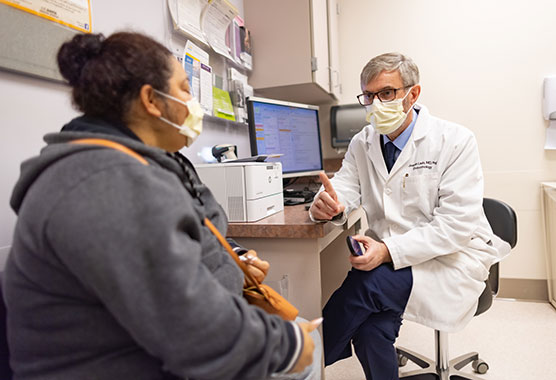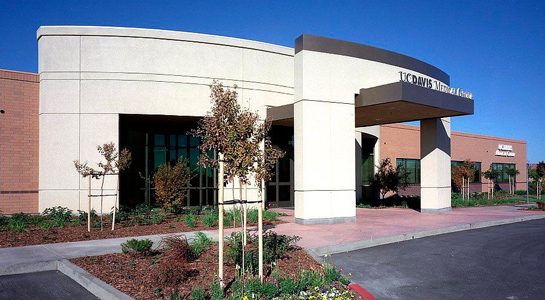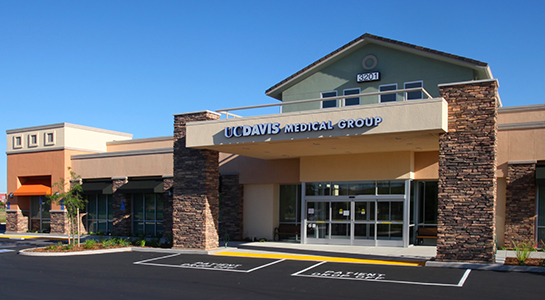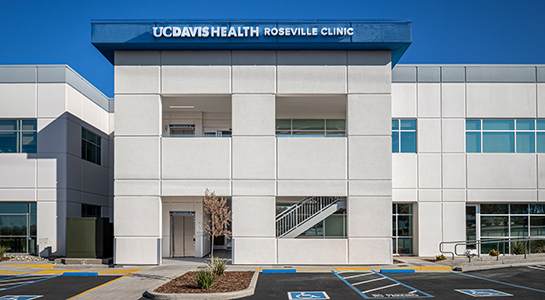Diabetes and Related Disorders
We offer support, education and specialized expertise to help you manage diabetes and related health conditions.
Medically reviewed by Gabrielle Burt, RN on Dec. 18, 2023.

Nationally Ranked for Diabetes Care
About 37 million adults in the U.S. (more than 11%) have diabetes. At UC Davis Health, we’re recognized regionally and nationally for our expertise with this disease and all metabolic and endocrine disorders.
U.S. News & World Report ranks us among the top 50 hospitals in the nation for both adult and pediatric diabetes and endocrinology. We’re also a high performing hospital for diabetes, with outcomes and patient care exceeding national averages.
What Is Diabetes?
Diabetes (diabetes mellitus) refers to a common group of conditions that occur when your blood sugar (glucose) is too high. It is a metabolic disorder, which means your body can't properly make energy from the food you eat.
When you have diabetes, your body has problems making or using insulin. Insulin is a hormone that allows your cells to use the glucose in your blood.
Uncontrolled diabetes can lead to serious health complications. Some types of diabetes are reversible, while others are long-term (chronic) and require lifelong care.
The main types of diabetes include:
Prediabetes
Prediabetes means your blood sugar is higher than normal. It indicates that you’re at high risk for developing type 2 diabetes. About 80% of people with prediabetes don’t know they have the condition because it rarely causes symptoms.
Type 1 Diabetes
Type 1 diabetes is an autoimmune disease typically diagnosed during childhood. Your immune system attacks cells in your pancreas, which keep it from making enough insulin. This form of diabetes tends to run in families (inherited) and is not related to lifestyle factors.
Type 2 Diabetes
Type 2 diabetes is the most common form, affecting between 90% and 95% of people with diabetes. Type 2 diabetes develops when your body doesn’t make enough insulin or can’t use insulin well. It’s often related to obesity and lifestyle factors.
Gestational Diabetes
Gestational diabetes can develop when your body doesn’t make enough insulin during pregnancy. It affects between 2% and 10% of pregnancies each year. Gestational diabetes usually goes away after the baby is born but increases the mother's risk of developing type 2 diabetes later in life.
Request an Appointment
As Sacramento's No. 1 hospital, you'll benefit from unique advantages in primary care and specialty care. This includes prevention, diagnosis and treatment options from experts in 150 specialties.
Referring Physicians
To refer a patient, submit an electronic referral form or call.
800-4-UCDAVIS
Patients
Call to make an appointment.
Consumer Resource Center
800-2-UCDAVIS
Diabetes Symptoms
Prediabetes doesn’t usually cause symptoms, so many people don’t realize they have type 1 or type 2 diabetes until problems develop. Visit your health care provider if you notice any of the following common symptoms.
Common Diabetes Symptoms
- Extreme thirst or hunger
- Fatigue
- Frequent urination
- Skin problems, such as sores that don’t heal
- Tingling or numbness in your hands or feet
- Unexplained weight loss
- Vision problems
Diabetic Emergency Signs
Seek medical care immediately or call 911 if you experience symptoms of dangerously high blood sugar (hyperglycemic emergency).
- Drowsiness or feeling faint
- Excessive sweating
- Extreme thirst
- Loss of consciousness
- Rapid heart rate and breathing
- Seizure
- Sweet-smelling breath
Diabetes Causes and Risk Factors
Your pancreas plays an important role in digestion and metabolism. It produces a hormone called insulin. Insulin carries sugar from your bloodstream to your muscle and fat cells, which store or convert the sugar to energy. This helps regulate blood glucose levels because it moves sugar out of your bloodstream.
When you have diabetes, your body doesn’t make or use insulin as it should. Your pancreas might not make enough insulin, which occurs with type 1 diabetes. Or your cells might develop insulin resistance, which means they don’t accept insulin or the sugar it carries.
Risk factors increase your chances of developing a condition. Obesity and physical inactivity are the two biggest risk factors for insulin resistance and type 2 diabetes.
Diagnosing Diabetes
Fasting blood glucose test: This blood test measures the amount of sugar in your blood after you’ve been fasting (not eating or drinking anything except water) for about eight hours. A blood sugar level of 126 mg/dL or higher means you have diabetes.
A1C Test
An A1C test measures your average blood sugar levels over two to three months. An A1C of 6.5% or higher means you have diabetes.
Oral Blood Glucose Test
This test measures the amount of glucose in your blood before and for several hours after you consume a sugary drink. A blood sugar level of 200 mg/dL or higher after two hours means you have diabetes.
Diabetes Complications
Unmanaged diabetes can lead to chronically high blood sugar and serious health complications. Diabetes is the leading cause of kidney disease, blindness and lower limb amputations.
Here’s how diabetes can affect your body:
Foot Problems
Nerve damage and reduced circulation due to diabetes can lead to slow- or non-healing foot sores prone to infection.
Gum Disease
High blood sugar increases the risk of problems in your mouth, such as cavities, bleeding gums and tooth decay.
Hearing Loss
Diabetes can damage nerves and blood vessels in your ears. People with diabetes are twice as likely to experience hearing loss as people without diabetes.
Heart Disease
Diabetes, which is often accompanied by high cholesterol and high blood pressure, damages blood vessels and can lead to coronary artery disease.
Chronic Kidney Disease
Chronic (long-term) high blood glucose damages blood vessels and nerves in your kidneys so they don’t work as well as they should. Diabetes is the leading cause of chronic kidney disease.
Nerve Damage
Diabetic neuropathy is nerve damage due to diabetes. It can lead to tingling, numbness or weakness in your arms, legs, hands and feet.
Vision Loss
Diabetic retinopathy is the result of damage to the blood vessels in your retina. Poor blood flow in your retina can lead to blurred vision or blindness.
Managing Diabetes
At UC Davis Health, we help you manage diabetes for life. A team of endocrinologists, internal medicine physicians, registered dietitians, certified diabetes education nurses and other experts oversees your care. We also have the specialists you need for diabetes complicated by heart disease, kidney disease and related conditions.
We offer diabetes health education classes, diabetes testing and convenient diabetes clinics throughout Sacramento. You receive the individualized guidance and support you need to live a longer, healthier life.
Blood Glucose Monitoring
Daily blood glucose checks are an important part of diabetes management. You may use a blood glucose meter or a continuous glucose monitor. Your provider can help you decide which method is right for you.
Medication
Some people with diabetes take insulin to control their blood sugar levels. You can take insulin using a needle, pen, pump or inhaler. We may recommend other medicines to help your body make more insulin or process sugar more efficiently.
Lifestyle Changes
A healthy diet and regular exercise can help you regulate your blood sugar, lose weight and keep your cholesterol and blood pressure under control. A registered dietitian can help you select food that fits your medical and nutritional needs.
Preventing Diabetes
Type 1 diabetes isn’t preventable, but you can lower your risk of prediabetes and type 2 diabetes by:
- Eating a healthy diet
- Exercising for 30 minutes each day
- Getting plenty of sleep
- Keeping other health conditions under control
- Losing weight
- Lowering your blood pressure and cholesterol
- Managing stress
- Not smoking
Find out if weight loss medications can really help you lose weight
"Prediabetes – Your Chance to Prevent Type 2 Diabetes," Centers for Disease Control and Prevention (CDC), https://www.cdc.gov/diabetes/basics/prediabetes.html
"What is Diabetes?" CDC, https://www.cdc.gov/diabetes/basics/diabetes.html
"Gestational Diabetes," CDC, https://www.cdc.gov/diabetes/basics/gestational.html
"Diabetes Complications," Endocrine Society, https://www.endocrine.org/patient-engagement/endocrine-library/diabetes-complications
"Diabetes and Hearing Loss," CDC, https://www.cdc.gov/diabetes/managing/diabetes-hearing-loss.html
Diabetes in the U.S.
37MPeople have diabetes
Diabetes is the
8thLeading cause of death in the U.S.
Awareness
1 in 5People don’t know they have diabetes
Sources: Centers for Disease Control and Prevention (CDC): Diabetes Fast Facts
We offer diabetes diagnosis and treatment at four of our clinics throughout the Sacramento region.
-

Elk Grove
See more clinic informationarrow_forwardlocation_on 8110 Laguna Blvd., Elk Grove, CA 95758
call 916-683-3955
-

Folsom
See more clinic informationarrow_forwardlocation_on 14264 Innovation Drive, Folsom, CA 95630
call 916-946-1700
-

Rancho Cordova
See more clinic informationarrow_forwardlocation_on 3201 Data Drive, Rancho Cordova, CA 95670
call 916-851-1440
-

Roseville
See more clinic informationarrow_forwardlocation_on 1620 E. Roseville Pkwy., Roseville, CA 95661
call 916‑783‑7109

Ranked among the nation’s best hospitals
A U.S. News & World Report best hospital in cardiology, heart & vascular surgery, diabetes & endocrinology, ENT, geriatrics, neurology & neurosurgery, and pulmonology & lung surgery.

Ranked among the nation’s best children’s hospitals
U.S. News & World Report ranked UC Davis Children’s Hospital among the best in pediatric nephrology, orthopedics*, and pulmonology & lung surgery. (*Together with Shriners Children’s Northern California)

Ranked Sacramento’s #1 hospital
Ranked Sacramento’s #1 hospital by U.S. News, and high-performing in aortic valve surgery, back surgery (spinal fusion), COPD, colon cancer surgery, diabetes, gynecological cancer surgery, heart arrhythmia, heart failure, kidney failure, leukemia, lymphoma & myeloma, lung cancer surgery, pacemaker implantation, pneumonia, prostate cancer surgery, stroke, TAVR, cancer, orthopedics, gastroenterology & GI surgery, and urology.

The nation’s highest nursing honor
UC Davis Medical Center has received Magnet® recognition, the nation’s highest honor for nursing excellence.

World-class cancer care
One of ~59 U.S. cancer centers designated “comprehensive” by the National Cancer Institute.

A leader in health care equality
For the 13th consecutive year, UC Davis Medical Center has been recognized as an LGBTQ+ Healthcare Equality Leader by the educational arm of America’s largest civil rights organization.

